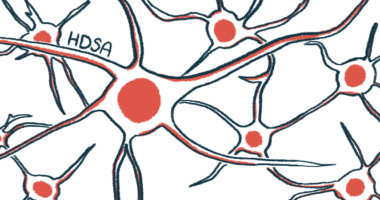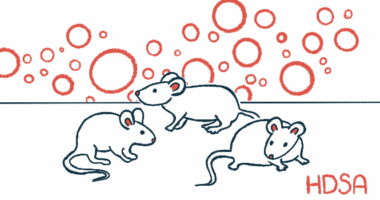Huntington’s Patient Finds Hope as Participant in GENERATION HD1 Trial

Railway signalman Sandy Patience has witnessed the devastating effects of Huntington’s disease on family members. When he learned two years ago that he, too, inherited the neurodegenerative disorder, the news was crushing.
But now, as one of the first Scotland residents to participate in an international Phase 3 trial testing an investigational therapy for Huntington’s, his mood has improved markedly.
“It feels like I’m doing something positive for the first time to fight this horrible illness and make a difference to people’s lives in the future,” Patience, 57, said in a press release.
Ultimately, Patience will be joined by about 900 others in the study, called GENERATION HD1. The trial (NCT03761849) will assess the efficacy and safety of RG6042, formerly known as INOIS-HTTRx — an investigative antisense oligonucleotide that was developed by Ionis Pharmaceuticals and later acquired by Roche (also known as Genentech in the United States).
The potential treatment is designed to target and destroy all forms of mutant huntingtin protein — the underlying cause of Huntington’s — potentially delaying or halting disease progression. Current therapies only help manage disease symptoms.
Sponsored by Hoffmann-La Roche, the placebo-controlled trial will take place at some 101 locations in U.S. states plus Washington D.C., and in countries around the world. For more information on the trial, which is currently recruiting, click here.
After losing his mother to Hungtington’s, and seeing the disease’s effect on his sister, Patience wanted to learn his status. On Dec. 4, 2017, he discovered that he had the disease.
Huntington’s, which affects three to seven out of every 100,000 individuals, is characterized by uncontrolled jerking and writhing movements, loss of thinking ability, and psychiatric problems.
“Everyone I have ever loved has been affected by this illness,” Patience said. “Seeing family members suffer and understanding that might also be your future is a very difficult thing to deal with.”
Still, the Inverness resident was floored by the diagnosis.
“When the test was positive, I came out absolutely devastated,” he said. “I was at such a low point, I didn’t know how I could go on. But fortunately, that feeling didn’t last long.”
A few weeks later, Patience saw a televised report about the GENERATION HD1 trial and its early success.
“I have waited 50 years for this, not just for me but for everyone — my mum who is no longer here and all the people who have been affected by this, not just in my life but around the world. As soon as I saw the report, I thought: I’ve got to chase this. I want to be one of those to take part and play my own small part in taking the fight to Huntington’s.”
Every two months, Patience, who is married, travels to the Aberdeen Royal Infirmary — one of 11 trial sites in the United Kingdom — where a brain fluid sample is taken for analysis. That’s followed by administration of either RG6042 or a placebo into the spinal canal. In addition to evaluating treatment safety and efficacy, researchers will monitor any changes in symptom severity, disease progression trajectory, motor and cognitive function, and behavioral manifestations. This will go on for about two years.
“GENERATION HD1 is a truly groundbreaking Phase 3 trial, bringing together researchers from around the world to work on [what] we hope will be one of the definitive studies in the field of Huntington’s research,” said University of Aberdeen professor Zosia Miedzybrodzka, who is leading the study in Aberdeen. “Obviously, there is a long way to go yet, but the trial does offer real hope to families with [Huntington’s].”
As for Patience, his perspective has changed for the better since enrolling in the study.
“I’m hoping against hope that I am on the trial drug, but even if I’m on the placebo, the trial has had a very positive effect on my life,” he said. “From a real place of darkness, I am now able to focus on the good. I could write a book about the illness and its effects, but right now I’m too busy living.”






